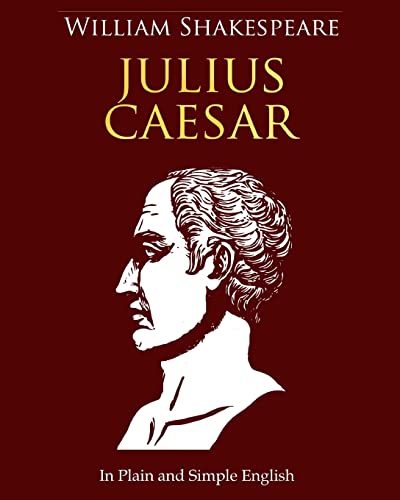Julius Caesar In Plain and Simple English
A Modern Translation and the Original Version
William Shakespeare
BOOK REVIEW

The echoes of daggers clashing, the murmurs of betrayal, and the haunting specter of ambition converge in Julius Caesar In Plain and Simple English: A Modern Translation and the Original Version. Shakespeare's exploration of power, loyalty, and the tragic consequences of ambition reaches beyond the confines of time, presenting a narrative ripe for both reflection and revelation. In this rendition, readers aren't merely spectators; they are thrust into the heart of the chaos, feeling every stab of betrayal and the chilling silence that follows the fall of the mighty.
William Shakespeare, a titan of literature, wielded words like a master swordsman, forging unforgettable characters and timeless themes. His works are not just stories; they are lifelines to understanding the breadth of human emotions. In Julius Caesar, written during a politically tumultuous era, he captured the essence of ambition and its perilous pursuit. We see ambitions collide-Caesar's meteoric rise, Brutus's idealism, and Cassius's cunning-all culminating in a plot drenched in blood and regret. Shakespeare's original prose, imbued with eloquence and poignancy, contrasts starkly with the plain translation, which breathes fresh air into his words while maintaining the core of the drama.
The magic of this modern translation lies not just in its accessibility, but in how it invites readers-those unfamiliar with the Elizabethan jargon-to step into the tumult of ancient Rome. The dual presentation allows for a rich experience; one can revel in the lyrical beauty of Shakespeare's original while simultaneously grasping the essence of the narrative in contemporary language. This dynamic dance between the two is nothing short of exhilarating. The translators have stripped away the barriers of time, allowing Caesar's tragic story to resonate with today's audience who finds themselves mired in similar struggles for power and identity.
Emotions run high as you dive into the text. The political machinations are thrilling, providing a backdrop for introspection about moral dilemmas that plague us even now. You will find yourself questioning loyalty, pondering the weight of ambition, and reflecting on the fragility of friendship. The famous line, "Et tu, Brute?" sends shivers down your spine, signifying the ultimate betrayal that shakes the foundations of trust. It serves as a chilling reminder that betrayal often comes from those we hold closest.
Reader responses to this modern translation have been varied yet overwhelmingly positive, particularly from those who feel alienated by the complexities of Shakespeare's original syntax. Many have expressed newfound clarity and appreciation for the themes they once found convoluted. Others claim it's an ideal starting point for students or casual readers who want to engage with Shakespeare without the intimidation of archaic language. Critics, however, often ponder whether this translation truly captures the gravitas of Shakespeare's artistry. Yet, what they might be missing is the sheer brilliance of unmasking complex themes in a digestible format that invites widespread discourse.
The historical context of Julius Caesar solidifies its importance. Written against a backdrop of political unrest and social upheaval, the play reflects the anxieties of its time while holding up a mirror to our present. The questions of governance, power, and loyalty are as potent today as they were during the Roman Empire. It is perhaps a tragic comedy that we continue to replicate the mistakes of history. The ambitious rise and subsequent fall of Caesar echo the discontent and desires of modern leaders, sparking debates on the real cost of power and the moral implications that accompany it.
Every betrayal, every pang of ambition, every flicker of hope etched in this narrative endures through the ages, tying us to the very fabric of human experience. Whether you're a seasoned Shakespearean aficionado or a newcomer embroiled in the world of literary exploration, this dual translation offers not just a glimpse into the past but a profound understanding of the relentless pursuit of power and the chaos it can unleash.
As you turn the pages of Julius Caesar In Plain and Simple English, allow yourself to feel the weight of every decision and the echo of every step taken in the shadow of ambition. Dive deep into the world of Rome, where the stakes are not just political but profoundly personal. This isn't merely a play; it's a journey through the corridors of power, a stark reminder that history is not merely taught, but lived and relived in our everyday choices. The question remains: will you rise, or will you fall? 🌪💔
📖 Julius Caesar In Plain and Simple English: A Modern Translation and the Original Version
✍ by William Shakespeare
🧾 116 pages
2012
#julius #caesar #plain #simple #english #modern #translation #original #version #william #shakespeare #WilliamShakespeare